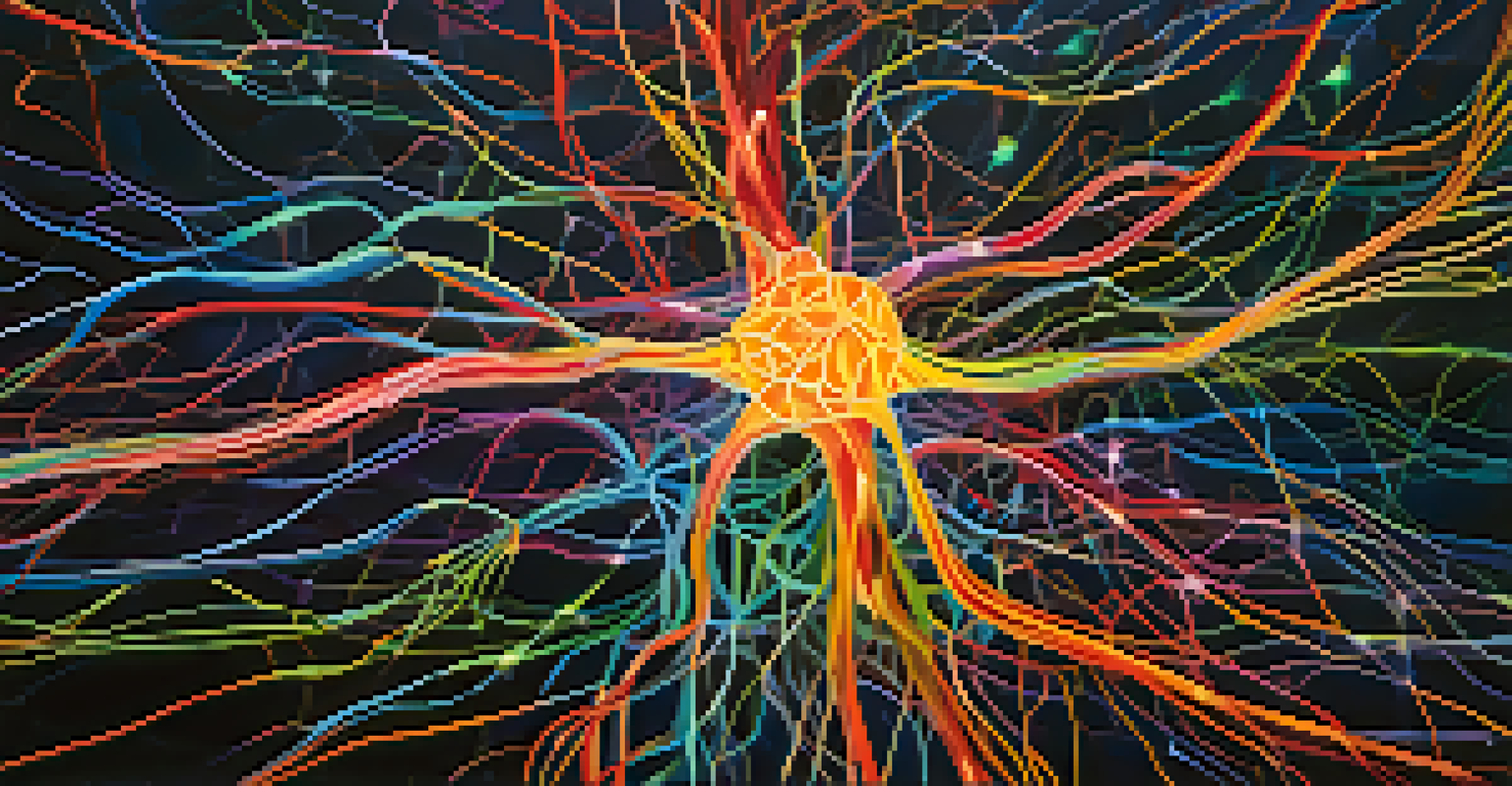Implications of Hallucinogen Use in Psychotherapy Practice

Understanding Hallucinogens and Their Therapeutic Potential
Hallucinogens, such as psilocybin and LSD, have been gaining attention in psychotherapy for their potential to treat various mental health conditions. These substances can alter perception and consciousness, leading to profound insights during therapy sessions. Researchers are increasingly exploring how these experiences can facilitate emotional breakthroughs and promote healing.
The greatest discovery of my generation is that a human being can alter his life by altering his attitude.
The therapeutic use of hallucinogens is often linked to the concept of 'set and setting,' which refers to the mindset of the individual and the environment in which the substance is taken. This is crucial, as a supportive and controlled environment can lead to positive therapeutic outcomes. For many, this can mean the difference between a challenging experience and one that fosters significant personal growth.
As we delve deeper into the implications of hallucinogen use in psychotherapy, it's essential to consider both the potential benefits and the risks involved. While there’s promising evidence supporting these substances, the complex nature of human psychology necessitates a careful and ethical approach to their integration in therapeutic practices.
Legal and Ethical Considerations in Therapy
The legal status of hallucinogens varies widely across the globe, impacting their use in psychotherapy. Some regions have begun to decriminalize or regulate certain substances for therapeutic purposes, while others remain strictly prohibitive. Understanding these legal frameworks is vital for therapists considering incorporating hallucinogens into their practice.

Ethical considerations also play a significant role in this discussion. Therapists must navigate issues of informed consent, as patients may not fully understand the implications of using hallucinogens. Moreover, ensuring that patients feel safe and supported during their experiences is paramount to ethical practice.
Therapeutic Potential of Hallucinogens
Hallucinogens like psilocybin and LSD are being explored for their ability to facilitate emotional breakthroughs in psychotherapy.
As the conversation around hallucinogen use evolves, therapists must remain vigilant and educated about both legal and ethical guidelines. This not only protects their practice but also safeguards the welfare of their clients, fostering a responsible approach to innovative therapeutic methods.
The Role of Integration Therapy Post-Session
Integration therapy refers to the process of helping individuals make sense of their hallucinogenic experiences after the session. This aspect is crucial, as the insights gained during a hallucinogenic experience can sometimes be overwhelming or confusing. By providing a safe space for reflection, therapists can assist clients in anchoring these insights into their daily lives.
The mind is everything. What you think you become.
During integration therapy, clients may discuss their feelings, thoughts, and any realizations that emerged during their hallucinogenic experience. This dialogue can help solidify the therapeutic gains and promote lasting change, making the experience more than just a momentary event. It’s about weaving those insights into the fabric of one's life.
Effective integration can enhance the overall therapeutic journey, reinforcing the connection between the hallucinogenic experience and the client’s ongoing mental health. This ensures that the benefits of the session extend far beyond the initial experience, leading to more profound and enduring transformations.
Potential Benefits of Hallucinogens in Psychotherapy
Research indicates that hallucinogens can be effective in treating conditions like PTSD, depression, and anxiety. Many studies have shown that these substances can help patients confront traumatic memories with a new perspective, often leading to significant emotional relief. This transformative process can be a game-changer for those who have struggled for years with traditional therapy methods.
One of the fascinating aspects of hallucinogen use is its ability to foster a sense of interconnectedness and empathy. Clients often report feeling more connected to themselves, their emotions, and others around them. This heightened sense of awareness can lead to breakthroughs in understanding relationships and personal challenges.
Importance of Integration Therapy
Integration therapy is essential for helping clients make sense of their hallucinogenic experiences and anchor insights into their daily lives.
Moreover, the experience of altered states can promote neuroplasticity, which is the brain's ability to reorganize itself by forming new neural connections. This can be incredibly beneficial for mental health, as it allows individuals to develop healthier thought patterns and coping mechanisms, ultimately enhancing their overall well-being.
Risks and Challenges of Hallucinogen Use in Therapy
Despite the promising benefits, there are notable risks associated with hallucinogen use in psychotherapy. Some individuals may experience adverse reactions, such as anxiety or paranoia, especially if they have a history of mental health issues. It’s crucial for therapists to screen clients thoroughly and create personalized treatment plans that prioritize safety.
The unpredictable nature of hallucinogenic experiences can also pose challenges. While many clients may have positive experiences, others could face difficult emotions or confront painful memories that arise unexpectedly. Therapists must be trained to handle these situations sensitively and effectively, offering support throughout the process.
Balancing the potential for profound healing with the risks involved requires a nuanced approach. Therapists must stay informed about the latest research, continually assess client suitability, and maintain open lines of communication to navigate the complexities of this evolving field.
Training and Skills Required for Therapists
For therapists interested in incorporating hallucinogens into their practice, specific training is essential. Understanding the pharmacology, effects, and appropriate dosages of various hallucinogens can greatly enhance a therapist's ability to guide clients safely. Additionally, training in managing challenging experiences during sessions is vital for ensuring client safety and comfort.
Therapists also need to develop strong skills in creating a supportive environment. This includes establishing trust, fostering open communication, and being attuned to clients' needs throughout the therapeutic process. These interpersonal skills are crucial in helping clients navigate their experiences effectively.
Risks Require Careful Management
While hallucinogens show promise, therapists must navigate potential risks and ensure client safety through thorough screening and support.
As the field evolves, ongoing education will be key for therapists. Staying updated on the latest research, techniques, and legal developments will not only enhance their practice but also ensure that they provide the highest standard of care for their clients.
Future Directions for Hallucinogen Research in Therapy
The future of hallucinogen use in psychotherapy looks promising, with ongoing research exploring its efficacy and safety. As societal attitudes shift and more studies emerge, we may see an increase in acceptance and integration of these substances in therapeutic settings. This could lead to more refined practices and guidelines surrounding their use.
Innovative research designs, such as controlled clinical trials, will be crucial in establishing best practices for hallucinogen therapy. Understanding the long-term effects and optimal conditions for use will help guide therapists in their approaches, ensuring that clients receive the most effective treatment possible.

Ultimately, the goal is to create a robust framework that maximizes the benefits of hallucinogen use while minimizing risks. As we continue to learn and adapt, the integration of these substances in psychotherapy could transform mental health treatment, offering new hope for those in need.